Background
Mikhail Bakunin was born on May 18, 1814, in Premukhino in the Tver Province to a retired diplomat and landowner.

Bakunin in 1872
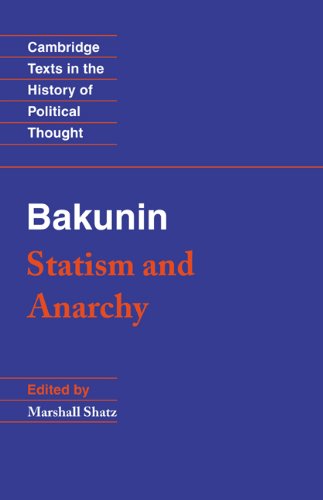
(Statism and Anarchy is a complete English translation of ...)
Statism and Anarchy is a complete English translation of the last work by the great Russian anarchist Michael Bakunin, written in 1873. Then he assails the Marxist alternative, predicting that a 'dictatorship of the proletariat' will in fact be a dictatorship over the proletariat, and will produce a new class of socialist rulers. Instead, he outlines his vision of an anarchist society and identifies the social forces he believes will achieve an anarchist revolution. Statism and Anarchy had an immediate influence on the 'to the people' movement of Russian populism, and Bakunin's ideas inspired significant anarchist movements in Spain, Italy, Russia and elsewhere. In a lucid introduction Marshall Shatz locates Bakunin in his immediate historical and intellectual context, and assesses the impact of his ideas on the wider development of European radical thought. A guide to further reading and chronology of events are also appended as aids to students encountering Bakunin's thought for the first time.
http://www.amazon.com/gp/product/B00INYG2ZM/?tag=2022091-20
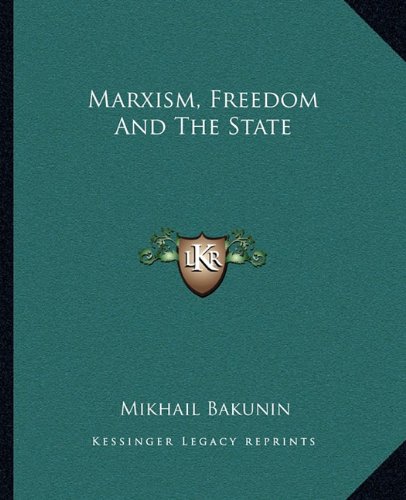
(This scarce antiquarian book is a facsimile reprint of th...)
This scarce antiquarian book is a facsimile reprint of the original. Due to its age, it may contain imperfections such as marks, notations, marginalia and flawed pages. Because we believe this work is culturally important, we have made it available as part of our commitment for protecting, preserving, and promoting the world's literature in affordable, high quality, modern editions that are true to the original work.
http://www.amazon.com/gp/product/1162672994/?tag=2022091-20
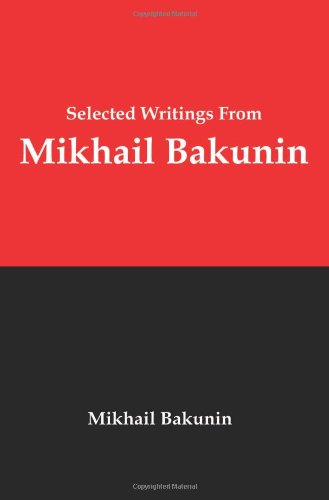
(A collection of writings from the champion of Anarchism, ...)
A collection of writings from the champion of Anarchism, Mikhail Bakunin. Includes "God and the State", "Marxism, Freedom and the State", "The Policy of the International", and "The Paris Commune and the Idea of the State". Preface gives a brief biography.
http://www.amazon.com/gp/product/1934941832/?tag=2022091-20
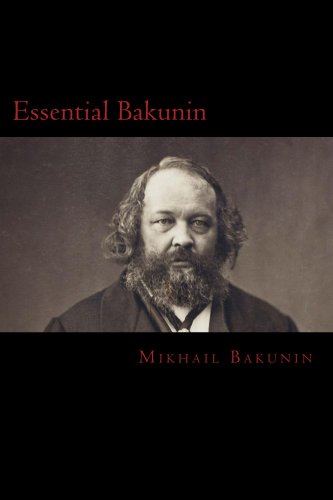
(A compilation of Mikhail Bakunin's works and writings. Ba...)
A compilation of Mikhail Bakunin's works and writings. Bakunin is arguably the father of modern Anarchist thought and has influenced every anarchist thinker since. This collection will familiarize the reader with Bakunin and his revolutionary thought.
http://www.amazon.com/gp/product/B008Y2RDB0/?tag=2022091-20
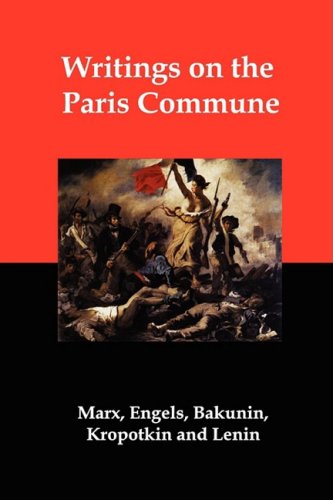
(The Paris Commune in 1871 played a key role in the develo...)
The Paris Commune in 1871 played a key role in the development of socialist thought. In the midst of a seige by German troops, the workers of Paris rose in revolt and established their own government. Both communists and anarchists claimed the Commune for their own. This volume includes essays on the Paris Commune by Karl Marx, Freidrich Engels, Mikhail Bakunin, Peter Kropotkin, and Vladimir Lenin.
http://www.amazon.com/gp/product/193494128X/?tag=2022091-20
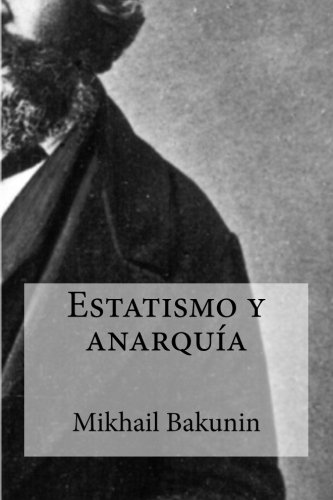
(Mijaíl Aleksándrovich Bakunin (Pryamukhino, Torzhok, Impe...)
Mijaíl Aleksándrovich Bakunin (Pryamukhino, Torzhok, Imperio ruso, 30 de mayo de 1815 - Berna, Suiza, 1 de julio de 1876) fue un anarquista ruso. Es posiblemente el más conocido de la primera generación de filósofos anarquistas y está considerado uno de los padres de este pensamiento, dentro del cual defendió la tesis colectivista y el ateísmo.
http://www.amazon.com/gp/product/1535235098/?tag=2022091-20
Mikhail Bakunin was born on May 18, 1814, in Premukhino in the Tver Province to a retired diplomat and landowner.
Mikhail studied at the artillery school.
After finishing his studies at the artillery school, he received a commission as an officer in the Guards. It is said that his father was angry with him and asked that Mikhail be transferred to the regular army.
Bakunin went to Moscow in 1836, and from that date life began in earnest for him. He had studied nothing before, he had read nothing, and his knowledge of German was very poor. But he was blessed with a gift for dialectics and for constant, persistent thinking. He mastered German to study the philosophies of Immanuel Kant, Johann Fichte, and G. W. F. Hegel. In 1842, while living in Berlin, Bakunin published an impassioned essay declaring Hegelianism a revolutionary tool and ending with the dictum that was to become the motto of international anarchism: "The passion for destruction is also a creative passion. " Bakunin participated in the Paris Revolution of 1848, made a fruitless attempt to organize a secret revolutionary international campaign for a Czech revolt, and participated in the Dresden rebellion of 1849. He was imprisoned in Russia until 1857 and then exiled to Siberia. In 1861 he escaped from Siberia to Japan, and on his way to Europe he stopped off in the United States. He declared his intention of becoming an American citizen. The poet Henry Wadsworth Longfellow portrayed the Russian in his diary as "a giant of a man with a most ardent, seething temperament. "
In 1862 Bakunin joined the revolutionary leaders Aleksandr Herzen and Nicholas Ogarev in London. Bakunin's intention was to devote all his energies to fighting for the freedom of the Russians and all the Slavs. He had not yet devised his anarchist doctrines, and he found himself advocating some of Herzen's views. Temperamentally the two men were so incompatible that they could not be comrades-in-arms, though they remained good friends. Bakunin's instincts were all against moderation, and conspiratorial intrigue was his goal. He embraced the cause of land and liberty and plunged into plotting with immense zest. He had plans for agitating in the army and among the peasantry, and he played with the idea of a vast revolutionary organization ringing Russia with a network of agents at strategic points on the border. Siberia was to be served by a branch located on the western coast of the United States.
The failure of the Polish insurrection in 1863 was a big disappointment to Bakunin, who henceforth became absorbed in a campaign of universal anarchy. Anarchism called for the replacement of the state with a loose confederation of autonomous units that would both end the injustices of private property and assure individual freedom. The millennium was to be achieved through an international rebellion set off by small groups of anarchist conspirators. Bakunin's anarchism, in theory, meant not disorder but lack of domination, a system without political power. At the end he appears to have lost his confidence in spontaneous popular uprising as the only sure method of destroying state governments.
Mikhail is considered among the most influential figures of anarchism, and one of the principal founders of the social anarchist tradition. Bakunin's enormous prestige as an activist made him one of the most famous ideologues in Europe, and he gained substantial influence among radicals throughout Russia and Europe.
(Mijaíl Aleksándrovich Bakunin (Pryamukhino, Torzhok, Impe...)
(Statism and Anarchy is a complete English translation of ...)
(The Paris Commune in 1871 played a key role in the develo...)
(A collection of writings from the champion of Anarchism, ...)
(This scarce antiquarian book is a facsimile reprint of th...)
(A compilation of Mikhail Bakunin's works and writings. Ba...)
Bakunin was also a militant atheist and thought religion was as great an enemy of freedom as the state was.
Bakunin thought that religion originated from the human ability for abstract thinking and fantasizing. According to Bakunin, religion is sustained by indoctrination and conformism. Another factor in the survival of religion is the existence of poverty, suffering and exploitation in real life, from which religion promises the salvation in the afterlife. Oppressors take advantage from religion, according to Bakunin, because many religious people reconcile themselves with injustice on earth by the promise of happiness in heaven.
Bakunin argued in his book God and the State that "the idea of God implies the abdication of human reason and justice; it is the most decisive negation of human liberty, and necessarily ends in the enslavement of mankind, in theory and practice." Consequently, Bakunin reversed Voltaire's famous aphorism that if God did not exist, it would be necessary to invent Him, writing instead that "if God really existed, it would be necessary to abolish Him."
Bakunin's increasing radicalism – including staunch opposition to imperialism in east and central Europe by Russia and other powers – changed his life, putting an end to hopes of a professorial career. He was eventually deported from France for speaking against Russia's oppression of Poland. Although Bakunin accepted elements of Marx’s class analysis and theories regarding capitalism, acknowledging "Marx’s genius", he thought Marx's analysis was one-sided, and that Marx's methods would compromise the social revolution. More importantly, Bakunin criticized "authoritarian socialism" (which he associated with Marxism) and the concept of dictatorship of the proletariat which he adamantly refused.
Bakunin reached the conclusion that revolution is necessary, regardless of the point of the critique of society from which it starts. He frequently attempted to give a philosophical foundation to revolution. The whole history of mankind appeared to him as "the revolutionary negation of the past. … Man has liberated himself (by breaking the divine commandment not to eat of the tree of knowledge); he has divided himself from animal and made himself man; he began his history and his human development with his act of disobedience and knowledge, that is, with rebellion and thought."
Bakunin held that there are principles which are the moving force of both the individual and the historical process. These are human animality, thought, and revolt. Social and private economy correspond to the first, science to the second, and freedom to the third. Man has an innate instinct for revolt. therefore, man's perpetual rebellion, which may lead to self-sacrifice and self-destruction, does not depend on either right or obligation but is immediately bestowed along with his humanity. Revolution can be looked upon as a theoretically perpetual situation or as an almost-infinite process. In theory, revolution may at some time cease and be replaced by a new order; in practice, it lasts so long that it must claim the attention of at least a whole generation. According to Bakunin, the goal of his generation was to destroy; the reconstruction would be done by others who would be better, fresher, and wiser. Bakunin never abandoned this view.
Quotations:
"Everywhere, especially in France and England, social and religious societies are being formed which are wholly alien to the world of present-day politics, societies that derive their life from new sources quite unknown to us and that grow and diffuse themselves without fanfare. "
"We are convinced that liberty without socialism is privilege, injustice; and that socialism without liberty is slavery and brutality. "
After renewing his acquaintance with Marx, Bakunin joined, in 1869, the International Workingmen's Association (the "First International"), an organization of heterogeneous origins which, under Marx's leadership, had adopted a revolutionary program.
Quotes from others about the person
His lifelong friend Herzen once remarked about Bakunin: "This man was born not under an ordinary star, but under a comet. "
In 1810 Alexander Bakunin married Varvara Alexandrovna Muravyova who was 24 years younger than him.
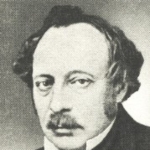
He was a German philosopher and political writer.
